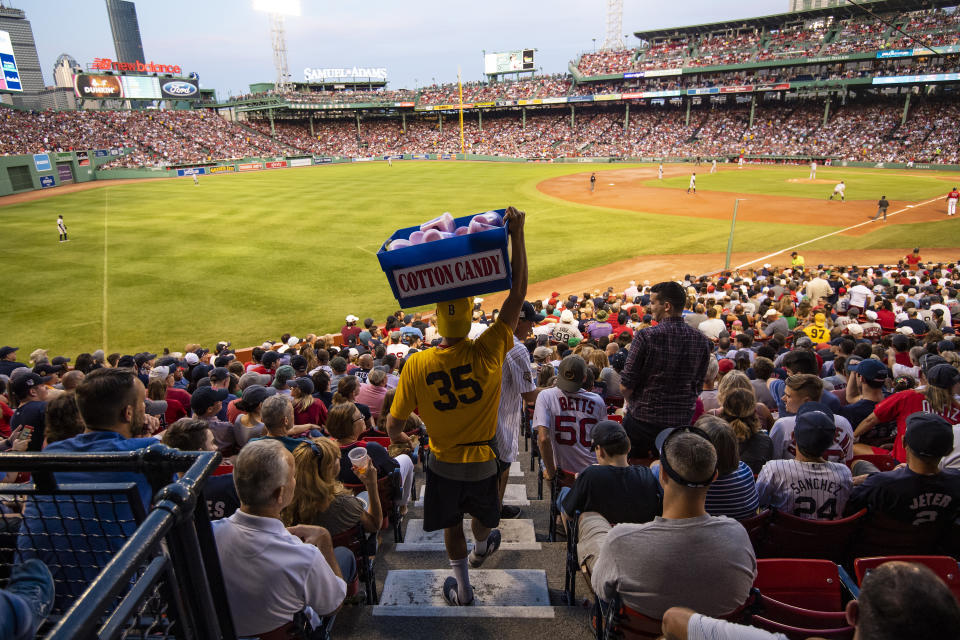Take notes, MLB. The KBO has some pointers for making baseball more fan-friendly
Reader, I’ve been watching Korean baseball for two days now. This makes me an expert, along with everybody else. So let me tell you some of the things I’ve learned in all this time living and breathing the KBO.
The 10-team Korea Baseball Organization began its season on Tuesday, the first major international league to return, albeit socially distanced and in empty stadiums, with a new and perhaps unenforceable ban on spitting.
In one opening day game, a boy in a giant bubble baseball represented the physical manifestation of the first pitch – a terrific solution to social distancing. And in the game shown on ESPN, NC Dinos first baseman Chang-min Mo delivered a crisp, all-in-the-wrists bat flip after putting his team up 4-0 with a solo home run.
Park Suk-min and Mo Chang-min go back-to-back!
The second guy's bat has not landed yet pic.twitter.com/KV3QNGAmvl— Talkin’ Baseball (@TalkinBaseball_) May 5, 2020
Baseball was back.
And a joyous, unpretentious brand of baseball at that. Because there’s a lot that Major League Baseball can learn from the KBO.
The trope that baseball is dying stateside is almost as old as the sport itself and it’s silly to argue that any business that almost tripled in size from 2003 to 2016 – with revenue ballooning from $3.6 billion to just over $10 billion – is in trouble. But there are things to take away nonetheless.
“I’ve never had more fun playing baseball than I did there,” pitcher Josh Lindblom told Yahoo Sports. “Just the joy of it.”
MLB could stand to be more fun. Which is to say that it would be better served by dropping its many unwritten rules, suffocating a sport and the joy derived therefrom. It’s why the World Baseball Classic, shorn of those pretensions, is such an appealing product; why fans in Japan are far more engaged; why the mood in the stands in Cuba is a lot looser. too. At a big league game, the loudest person in your section is often the ice cream guy.

Strides have been made on this score, with players encouraged to flash more of their personalities, a charge accidentally led by the irrepressible Yasiel Puig.
But there’s so much more fun to be had. Korea’s bat-flipping artistry is well-documented. Yet it doesn’t end there. Korean baseball also leads the way in weird glasses. Fans sing and chant in unison. Cheerleaders hype the crowd. Players scrub each other’s backs in the showers.
They have coordinated mascot dances. There are fire-breathing robot dragons, even though they have nothing do with their team or its mascot.
[Get up to speed on the KBO and choose your team with Yahoo Sports’ primer]
Each player doesn’t merely pick his own walk-up song – no no. Special theme songs are composed for them and they’re amazing. The atmosphere, above all else, is generated by the crowd itself, rather than being orchestrated by a PA system as spectators are tamely shepherded through whatever “fan engagement” is expected of them.
Oh, and there’s a universal designated hitter, skirting the entire farce of forcing the unskilled labor of pitchers hitting upon the public.
Whether through a lack of pitching and defensive talent or a disinterest in both, the KBO is all about offense. So much so that it had to un-juice – squeeze? – the ball last season because the league-wide batting average had swollen to a towering .286 and the average ERA crept above 5.00, the latter a full run higher than Major League Baseball’s.
This pleasing excess of action still didn’t come at the expense of game time. Our stateside league’s struggles with getting the average game time down – after it went from 2 hours before World War II to 2 ½ hours in the ‘70s and ballooned to over 3 hours now – have also afflicted the Koreans. At one point, their average game time had stretched to 3 hours and 23 minutes, worse even than MLB’s all-time high of 3 hours and 10 minutes last season.
But the KBO has also made far more aggressive efforts to remedy the problem, toying with a wider strike zone and instituting a 12-second pitch clock.
On Tuesday’s opening day, the Dinos-Lions game clocked in at 2 hours and 47 minutes while one game between the Hanwha Eagles and SK Wyverns ended in a swift 2 hours and 6 minutes. On the other hand, a Kiwoom Heroes matchup with the Kia Tigers took 3 hours and 18 minutes. Still, there’s a willingness there to rethink what the sport looks like, to tip over sacred cows, to go much further than MLB has, as it still can’t even get a pitch clock approved by the players union.
Korean baseball looks and sounds and feels lighter, more entertaining, more enjoyable. Because in Korean baseball, the fan, rather than tradition, comes first.
Leander Schaerlaeckens is a Yahoo Sports soccer columnist and a sports communication lecturer at Marist College. Follow him on Twitter @LeanderAlphabet.
More from Yahoo Sports:

 Yahoo Lifestyle
Yahoo Lifestyle 

